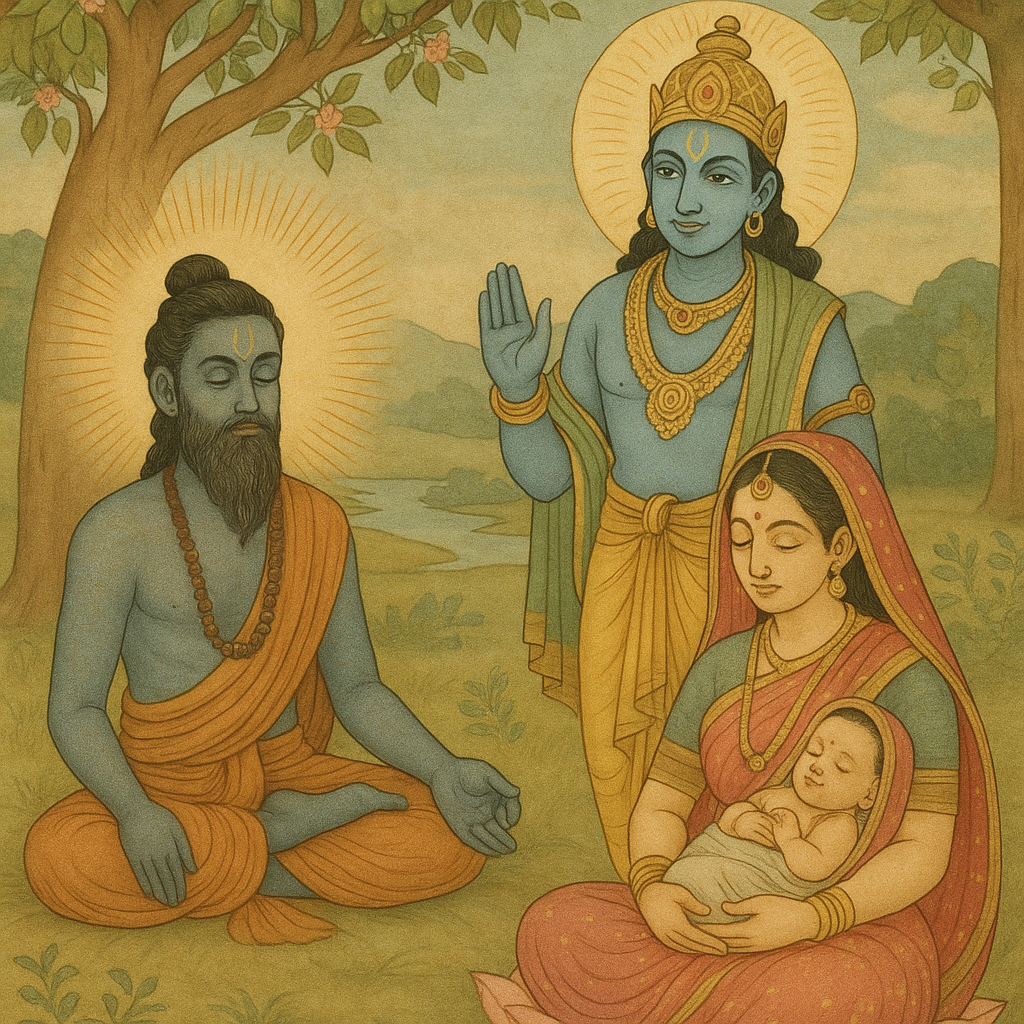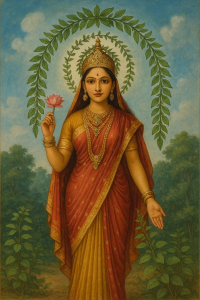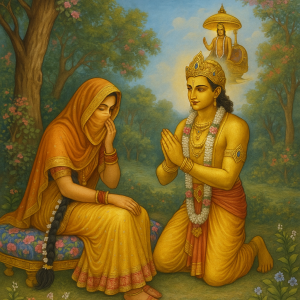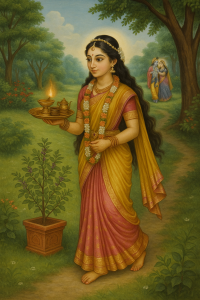The Noble Lineage of Danu
Long ago, in the divine lineage of sages and demigods, there lived the great sage Kaśyapa, the son of the progenitor Marīci and grandson of Lord Brahmā. Marīci was a direct mind-born son of Brahmā, thus placing Kaśyapa among the most revered ṛṣis of Vedic civilization.
Kaśyapa married thirteen of the daughters of Dakṣa, another prajāpati (progenitor of living beings). Among these wives, one was named Danu, a noble and chaste woman of exalted character. Kaśyapa loved her dearly, and she bore him many mighty sons—famous among them was Vipracitti, a warrior without equal, full of spiritual power and courage.
A Devotee Among the Dānavas
Vipracitti’s son was named Dambha, and he proved to be an extraordinary soul—self-controlled, disciplined, and a devout follower of Lord Viṣṇu. Though born in the race of Dānavas (usually considered demons), Dambha stood apart by his virtue and devotion.
Yet, despite all good qualities, he was troubled by one misfortune—he had no offspring. Yearning to beget a son of exceptional strength and spiritual depth, Dambha decided to perform intense austerities.
Penance in the Forest of Puṣkara
Dambha journeyed to the holy Puṣkara forest, a sacred land favored by sages for penance. There, he sat motionless, controlling his senses, and engaged in japa—repeating the holy names and mantras of Lord Kṛṣṇa.
He performed these penances with such intensity for one hundred thousand years that a powerful effulgence burst forth from his head, radiating through the universe. It became so scorching that the sages, Manus, and even the celestial gods were overwhelmed by the heat.
In panic, the demigods, led by Indra, rushed to the abode of Lord Brahmā, appealing for relief.
The Demigods Appeal to Lord Viṣṇu
Lord Brahmā, understanding the cause, brought the agitated demigods to Vaikuṇṭha, the spiritual realm, to seek the intervention of Lord Viṣṇu. Entering the transcendental atmosphere of Vaikuṇṭha, they offered obeisances to the Lord, their hearts full of reverence and concern.
“O Lord of the universe,” they prayed, “we are being scorched by an unbearable heat. Please tell us the source of this burning light.”
Lord Viṣṇu, smiling gently, replied, “Do not fear. This is not the end of the world, nor is it the time of cosmic dissolution. The cause of this heat is the penance of Dambha, a righteous asura and My devotee. He seeks a son who will be powerful, virtuous, and devoted to Me. I shall soon fulfill his wish and calm his fiery tapasya.”
Relieved and satisfied, the demigods returned to their abodes. Lord Viṣṇu then proceeded toward Puṣkara, where Dambha was still deep in meditation.
A Boon Fulfilled
When Lord Viṣṇu arrived, He saw Dambha repeating His holy name with full devotion. The Lord affectionately approached him and asked, “What boon do you desire from Me?”
Dambha immediately offered full prostrations and praised the Lord with heartfelt devotion:
“O lotus-eyed Lord of Lakṣmī, Master of the three worlds, kindly bless me with a son who is powerful, wise, fearless among the demigods, and completely devoted to You.”
Lord Viṣṇu nodded and said, “So be it. Your desire shall be fulfilled. Cease your austerities and return home.”
As the Lord vanished, Dambha bowed down in the direction He had departed, filled with gratitude. Returning home, he found his wife already pregnant, glowing with the divine light of the soul within her womb.
The Rebirth of Sudāmā
The child growing within Dambha’s wife was no ordinary being. He was Sudāmā, one of Lord Kṛṣṇa’s intimate cowherd friends in Goloka, now reborn due to a curse by Śrīmatī Rādhārāṇī. His previous life was that of a pure devotee who had once committed a great offense by disrespecting Rādhārāṇī during a moment of divine jealousy. As a result, he had been cursed to take birth among the Dānavas.
Now, by the will of the Lord, Sudāmā would be born as a mighty being and fulfill a divine mission on Earth.
The Birth of Śaṅkhacūḍa
In due course, the radiant wife of Dambha gave birth to a child who shone like the moon during its waxing phase. He was named Śaṅkhacūḍa.
From childhood, he displayed intelligence, humility, and devotion. He studied the śāstras, learned the Vedic codes, and practiced the duties prescribed for rulers and devotees alike. He brought delight to his parents and joy to all who saw him.
The Blessing of Lord Brahmā
As he came of age, Śaṅkhacūḍa felt an inner stirring—a desire to accomplish something great and meaningful. Desiring to obtain strength and divine support, he went to Puṣkara, just as his father had, to perform austerities and attain a special boon.
He meditated on Lord Brahmā, following the mantra and instructions of his guru, Jaigiṣavya. After a long period of dedicated penance, Lord Brahmā appeared before him and offered him a blessing.
Śaṅkhacūḍa, bowing low, spoke with humility, “O Grandfather, please grant me two boons: let me become invincible to the demigods, and let me marry Tulasī.”
Brahmā replied, “So be it.” Then, taking from his own divine treasury, he gave Śaṅkhacūḍa a powerful and sacred amulet known as Sarvamaṅgalamaya—the “Conqueror of the World.” This divine jewel, infused with Lord Kṛṣṇa’s energy, ensured victory wherever it was worn.
Brahmā then added, “Now go to Badarikāśrama. There, Tulasī Devī is performing penance with the desire to attain a suitable husband. She is the daughter of King Dharmadhvaja and destined to be your wife.”
With a radiant heart, Śaṅkhacūḍa tied the divine amulet around his neck and set out toward Badarikāśrama, eager to fulfill the prophecy and meet his eternal beloved.
Lessons to Be Learned
1. Devotion Is Not Limited by Birth or Race
Though Dambha and Śaṅkhacūḍa were born in the Daitya dynasty, traditionally known as “demons,” their hearts were pure and devoted to Lord Viṣṇu. Śrīla Prabhupāda often emphasized that real Vaiṣṇavas are recognized not by birth but by qualities: humility, devotion, self-control, and knowledge.
“Anyone who is a devotee of the Lord, regardless of birth, is exalted.” – Śrīla Prabhupāda
2. Austerity Becomes Powerful When Directed to the Lord
Dambha’s long and disciplined austerities scorched the worlds—but they were not out of pride or selfishness. His aim was to serve and glorify the Lord through a qualified son. When penance is directed toward service to the Lord, it becomes potent and transformative.
3. The Lord Responds to Sincere Prayers
Lord Viṣṇu personally came to grant Dambha’s wish, showing how the Lord reciprocates with the desires of His devotees. Whether a childless father, a suffering soul, or a seeker of transcendence—if one turns to the Lord with sincerity, the Lord never neglects that plea.
4. Divine Births Are Arranged by the Supreme Lord
Śaṅkhacūḍa’s appearance was not ordinary—it was the result of a curse and a divine arrangement. Even the apparent fall of a devotee like Sudāmā becomes part of the Lord’s greater plan. For a devotee, no fall is permanent, and every circumstance can become a step toward eternal service.
5. Material Strength Without Devotion Is Dangerous, But Strength With Devotion Is a Blessing
Śaṅkhacūḍa received a powerful boon and an undefeatable amulet. But his devotion to Lord Kṛṣṇa remained central. Śrīla Prabhupāda warned that strength and wealth without devotion lead to arrogance, but when used in Kṛṣṇa’s service, they uplift the soul and benefit others.
6. The Power of Śāstra and Guru
Śaṅkhacūḍa succeeded in his austerities because he followed the mantra given by his guru, Jaigiṣavya. Prabhupāda taught that disciplic succession (guru-paramparā) and hearing from śāstra are essential in achieving success in devotional life.



